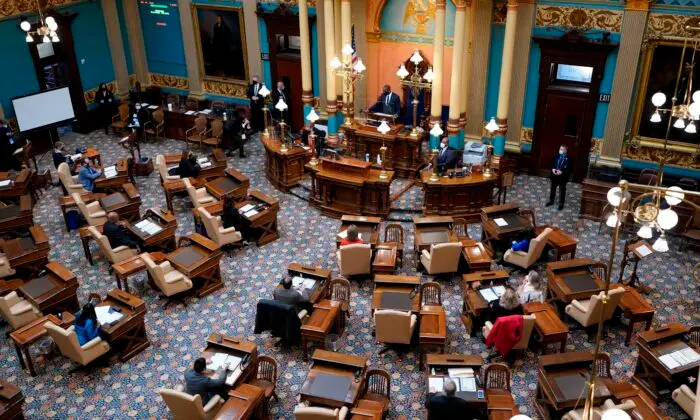A preliminary hearing concluded on April 24 for five Michigan Republicans who allegedly conspired to present a slate of false electors to the Electoral College for the 2020 presidential election.
Judge Kristen D. Simmons of Ingham County District Court 54-A must now determine if enough evidence exists to proceed with a criminal trial. A decision will not be made until eight other defendants have had a pretrial hearing, which will begin on May 28.
Appearing in court this week were Kathy Berden, 70, of Snover, a former member of the Republican National Committee; Meshawn Maddock, 55, of Milford, former co-chair of the Michigan Republican Party, Michele Lundgren, 74, of Detroit; John Haggard, 82, of Charlevoix; and Amy Facchinello, 55, of Grand Blanc have each pled not guilty to eight felony charges.
Hawaii, 1960
Republicans in seven states sent a slate of electors to Congress, claiming that they had met and elected Donald Trump. The idea for doing so appears to have originated with Hawaii’s handling of the electoral vote following the 1960 election between John F. Kennedy and Richard Nixon, which was decided by just 115 votes.After the first count, Nixon led by about 100 votes, and Hawaii’s governor certified the result.
Yet Democratic electors believed Kennedy would prevail in a recount and met to cast ballots for him. The governor chose to certify both sets of electors and let Congress decide which to include once the recount was finished.
Kennedy did win the popular election, and Nixon, who was vice president at the time, presided over the Congress that counted the Democratic votes from Hawaii.
An assistant attorney general in Michigan, Kahla Crino, said in court on Feb. 14 that the Hawaii case lay behind the multiple 2020 efforts to certify alternate electors.
“Somehow, your honor, this became, and the people do not dispute, that this became inspiration for a multistate criminal conspiracy that was absolutely linked to the Trump campaign,” Ms. Crino said.
Alternate electors from Pennsylvania cited the Hawaii example in a 2020 press release. “We took this procedural vote to preserve any legal claims that may be presented going forward,” said Bernie Comfort, chair of the Trump campaign in Pennsylvania. “This was in no way an effort to usurp or contest the will of the Pennsylvania voters.”
In the Michigan hearing, defense attorneys appeared to lay the groundwork for a claim that presenting an alternate list of electors was reasonable in this case because the result of the 2020 election in Michigan was disputed at the time.
Objecting to a witness’s assertion that no lawsuit contesting the Michigan election had been successful, George Donnini, a lawyer for Kathy Berden, argued that the mere fact that such litigation was pending was relevant to the case.
“Whether they were ultimately successful allegations does not matter,” Mr. Donnini said. “Were the allegations pending as of December 14, 2020? Yes, they were. Could they have resulted in a ruling in the Republican’s favor? Yes.”
President Biden won the popular election in Michigan by more than 150,000 votes.
Proving Intent
Laura Cox, former chair of the Michigan Republican Party, testified on Dec. 14 that she had questioned the plan and proposed and alternative. “They weren’t electors at the time, in my opinion,” Ms. Cox said. She suggested that the electors instead sign a document pledging to cast Electoral College ballots for President Trump “if the election was overturned.”Defense attorneys have questioned whether the defendants were aware of what they were signing.
In February, James Renner, 78, of Lansing, testified that he would not have participated in the plan if he’d thought it illegal. “We were told this was an appropriate process,” Mr. Renner said. “My background was enforcing the law, not breaking the law.”
“The purpose was to present the slate of candidates,” Mr. Renner said, “because we were told that the representatives and senators have the ability to accept our slate of candidates versus the Democratic slate of candidates—but it had to be there by two o’clock.”

Charges against Mr. Renner were dropped last year when he entered a cooperation agreement with the prosecution.
Congress did not accept the alternate slate of electors from Michigan or any other states. Georgia and Nevada have pressed charges against alternate electors. In Wisconsin, the alternate electors agreed to a settlement in which they conceded that President Biden won the election and that they had attempted to overturn the result.






